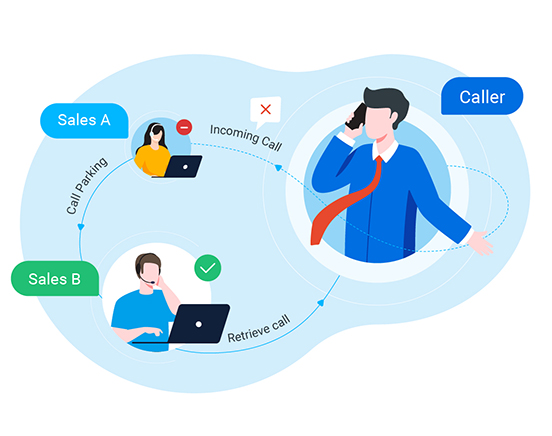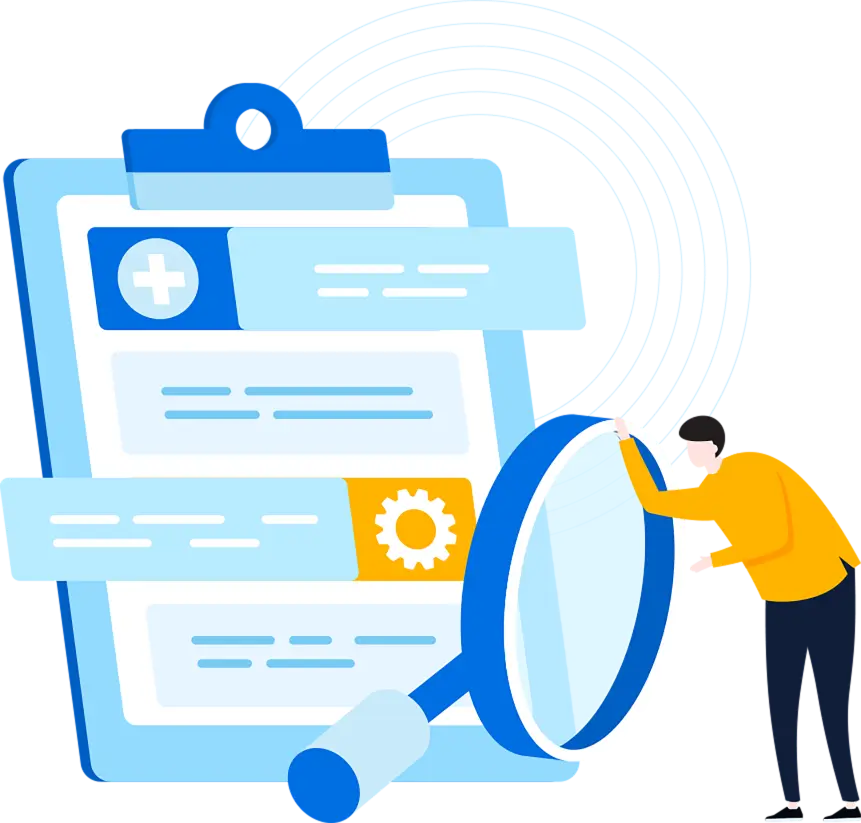Call parking is a business phone system feature that makes it easier for companies to handle high call volumes. It enables better call center teamwork and improves customer experience. Let’s take a closer look at what call parking is, how to use it effectively, and its benefits.
What is Call Parking?
Call parking allows a user to place an active call on hold and retrieve it from any other phone within the system. When a call is parked, it is temporarily stored in a designated “parking lot” or extension, instead of being tied to a specific phone or location. This enables users to answer or retrieve the call from any phone by dialing the assigned parking extension number.
Call parking is particularly useful in situations where a call needs to be transferred or handed off to another person, but the recipient is not immediately available to take the call. Instead of transferring the call directly to voicemail or risking the caller being put on hold for an extended period, the call can be parked, allowing the intended recipient to pick it up from any phone when they become available.

How Call Parking Works?
Agents can park an active call by dialing the Park Call Feature Code on their deskphone, or pressing the Park Call option from the visual call control panel of their desktop, browser, or mobile app. Afterwards, they can assign a parking spot number to finish call parking. Alternatively, they can choose to randomly park a call on the first available parking spot number. While a call is parked, all members of the call park group can pick up the call.
The retrieval of a parked call is also easy. Agents can simply dial the parking spot number or use other visual management tools to pick up the parked call in clicks.You can use the parking feature for both inbound and outbound calls.
During the parking, customers will have the same experience as their call is put on hold. The may hear music, announcements, or other based on your voice prompt settings in the phone system.
Benefits of Call Parking
The Use Case in Call Center
-
Step 1:Receptionist receives a new call and assists the caller.
-
Step 2:If the caller wants to speak to an agent in a department, but all of them are busy, the receptionist will park the call.
-
Step 3:To do it, the receptionist will dial the parked extension, and that number is the parking spot in the system.
-
Step 4:By doing that, the agents are notified about the parked call that is waiting for an answer.
-
Step 5:As soon as somebody is ready to pick up the call, the agent will only need to dial the extension number.
-
Step 6:The caller will be transferred back to the original parker when the time limit is over, meaning to the receptionist.

Further Readings & FAQs
How to configure the feature in Yeastar phone system?
Setting call parking up on Yeastar PBX Systems is easy and you won’t pay extra for this feature.For details, please refer th the user manual for different series of Yeastar phone System: P-Series Phone System | S-Series Phone System.
What is call park used for?
Call Parking is used by the VoIP phone system that lets you accept multiple calls at the same time that agents can answer when they are available.
Yeastar P-Series PBX System has the call parking feature built-in. The function has a number of customizations you can do in order to improve customers' calling experience. This includes hold music, timeout destination (voicemail, return to original parker, transfer to a predefined extension), and waiting time, among others.
Can I park a call and pick it up in the application?
Yes, one of the Call Parking features includes the possibility to switch devices. You can park a call yourself and pick it up on your portable device.
How can call parking improve company's performance?
Call Parking greatly improves communication in a company and lets employees take a break or get ready for new calls. Anyone can park a call for another agent to pick it up. This way, callers don't end up listening to voicemails but instead wait for a limited time to be answered by a company's representative.
How are parked calls better than call hold and transfer?
When a caller is put on hold, the call can be retrieved only by the same desk phone. In contrast, Call Parking has a dedicated place, a "parking lot," where multiple callers can wait and authorized users or agents can answer them.
Timeout Options
Call Parking feature lets companies manage the traffic without sacrificing customer experience. There is no time limit when on hold, and, eventually, the caller can disconnect.
Call Parking works differently. To be precise, there are timeout options to choose from, and you can decide whether to play hold music, the latest promotions, or company-related news. Call park features also include the timeout destination that decides what happens after the waiting time is finished.
Any Agent Can Pick Up an Inbound Call
A receptionist would usually use a Call Transfer feature; however, the caller bounces back if the agent is busy. This also prevents the receptions from receiving calls from other customers.
Multiple calls can be parked there simultaneously and available for every agent. This also gives agents the time to prepare and log necessary information before immediately taking the call.
What companies can benefit from call parking?
Any small business can work on making its communication effective and of high quality, especially businesses like:
-
Contact centers
-
Hotels
-
Hospitals
-
Insurance companies
-
And many others!
Is there any Ways to park an active call?
Not every parked phone behaves exactly the same. Different types of call parking have different experiences for both the customer and the agent, as described below for the two types of call parking:
General Call Parking
General Call parking is the communal space where everybody can pick up the call. It is available for all desk phones, and it has no restrictions. General parking also means that any call is parked randomly, meaning the system automatically assigns its number. All you need to do is to press the feature code on your dial pad.
Direct Call Parking
Direct Call Parking assigns the specific extension for the parked code. To do it, the receptionist has to dial the dedicated feature code + parking slot number. This feature is useful when you want to pass the extension to a specific agent who is either more knowledgeable about the issue or has previously been in contact with the caller.
Complete Business Communication Solution
Available in the Appliance, Software, and Cloud Edition, Yeastar provides
flexible deployment options,
allowing you to have your PBX system sited on-premises or in the
cloud.
Appliance Edition
If you prefer a plug-and-play system deployed within your company to ensure complete control, the Appliance Edition is the perfect fit.
See SpecificationsCloud Edition
Want to eliminate the workload of hardware installation while having your phone system up & running immediately? This is the option for you.
Learn MoreSoftware Edition
You make the call whether to install the PBX system on a hardware server, a virtual machine, or even in the cloud.
Learn More
